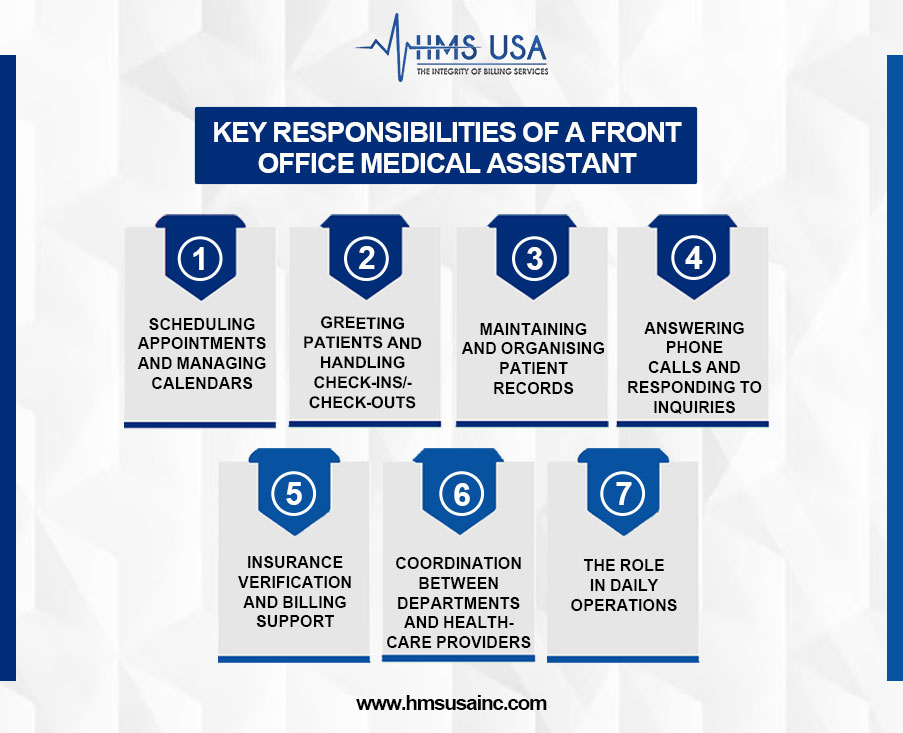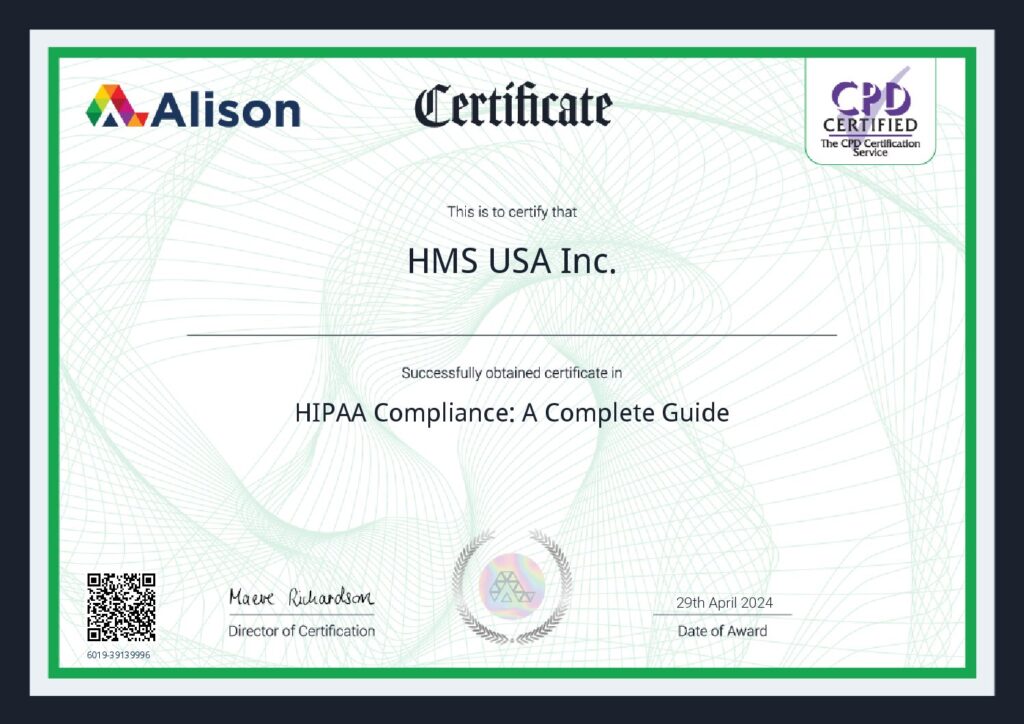The healthcare world is undergoing rapid change, driven by new technology, an aging population, and a growing emphasis on patient care. Amid all this, one role has become essential: the medical office assistant.
These professionals keep everything running smoothly behind the scenes, handling key tasks that enable doctors and nurses to focus on what matters most—patient care.
Curious about what a medical office assistant does? In this blog, we’ll dive into their vital role and show why they’re the backbone of every healthcare practice. Whether you’re thinking
About a career or looking to hire, you’ll see just how valuable they are!
Understanding the Role of a Medical Office Assistant
Medical Assistant Description
A medical front office assistant is in charge of the administrative tasks that need to be done at a medical centre. They greet patients, schedule appointments, verify insurance, and maintain records to ensure the front desk operates smoothly.
Clinical medical assistants take care of patients directly, while front office assistants do non-clinical tasks that keep the office running smoothly. They work in clinics, hospitals, and private offices, among other settings, and are crucial to ensuring that patients receive quality care and that providers can perform their duties effectively.
Key Responsibilities of a Front Office Medical Assistant
Front desk medical assistants are the first people patients and visitors encounter, so they play a crucial role in the smooth operation of a healthcare centre.
Front office medical assistant duties extend beyond assisting with documentation; they also have a direct impact on patient satisfaction and the smooth operation of the front desk.
- Scheduling Appointments and Managing Calendars
One of the primary responsibilities of a front office medical assistant is to schedule patient appointments accurately and efficiently. This includes coordinating provider availability, ensuring appropriate time allocations based on patient needs, and updating calendars to reflect any schedule changes. Effective scheduling minimises wait times and enhances workflow within the clinic.
- Greeting Patients and Handling Check-Ins/Check-Outs
A warm, professional greeting sets the tone for a patient’s visit. Front office medical assistants manage the check-in process by verifying appointment details, collecting necessary documentation, and ensuring all patient information is up to date. At check-out, they may provide follow-up instructions, schedule return visits, and process payments if needed.
- Maintaining and Organising Patient Records
Accuracy and confidentiality are paramount when handling patient records. Front office staff are responsible for maintaining up-to-date electronic and paper files, organising documentation, and ensuring that records are readily accessible to authorised personnel. This task is critical for timely and effective patient care.

- Answering Phone Calls and Responding to Inquiries
Medical assistants in the front office are tasked with managing incoming phone calls, which may involve answering questions about appointments, procedures, or clinic hours. They must be able to respond to inquiries with professionalism and accuracy, often serving as the liaison between patients and clinical staff.
- Insurance Verification and Billing Support
Insurance verification is a crucial step in preventing claim denials and ensuring proper billing. Front office medical assistants confirm insurance coverage before appointments and may assist with collecting copayments, processing billing information, and supporting revenue cycle operations.
- Coordination Between Departments and Healthcare Providers
Coordination across departments is essential in a multidisciplinary healthcare setting. Front office staff facilitate communication between physicians, nurses, lab technicians, and other departments to ensure that patient care is seamless and efficient.
- The Role in Daily Operations
The front office medical assistant plays a crucial role in maintaining the daily operations. From managing appointment logs to addressing patient needs, their duties are foundational to delivering timely, organised, and patient-centred care.
Essential Skills and Qualifications
- Interpersonal and Communication Skills
Effective verbal and written communication, active listening, and compassion are essential for fostering positive interactions with patients, their families, and medical staff.
- Attention to Detail and Organisation:
Accuracy in managing appointments, patient records, and billing is crucial, supported by strong organisational skills to minimise errors.
- Medical Terminology and Basic Billing Knowledge
Understanding medical terms and billing processes helps assist with provider documentation and insurance tasks.
- Computer Proficiency (EMR/EHR)
Skill in using electronic medical records systems is essential for scheduling, documentation, and record management.
- Multitasking Ability
Handling multiple duties simultaneously, like answering calls while checking in patients, is key to working efficiently in a dynamic setting.
- Customer Service and Professionalism
Maintaining a courteous and professional demeanour ensures patient satisfaction and upholds the facility’s reputation.
Front Office Medical Assistant Training and Education
- Educational Requirements
A high school diploma or GED is typically required to start as a front office medical assistant. Many employers prefer candidates with a postsecondary certificate or associate degree in medical assisting, which provides essential skills in administration, healthcare systems, and patient communication.
- Training Programs Overview
Training programs cover medical terminology, electronic health records (EHR), scheduling, insurance verification, billing, coding, and patient intake. Certificates can take about 9 months, while associate degrees may take up to 2 years. These are available at community colleges, vocational schools, and online.
- Certifications and Continuing Education
Certifications such as the Certified Medical Administrative Assistant (CMAA), Certified Medical Assistant (CMA), and Registered Medical Assistant (RMA) enhance credentials and job prospects. Continuing education enables professionals to stay current on healthcare regulations, software, and best practices through workshops and courses.
- Internships and Hands-On Experience
Internships or externships provide practical experience, enabling students to apply their skills in real-world clinical settings, build confidence, and gain valuable professional references. These experiences often lead to job opportunities.
Career Outlook and Advancement Opportunities
The demand for front office medical assistants is skyrocketing due to the expanding healthcare industry and the rising need for administrative support. The U.S. Bureau of Labour Statistics projects that medical assistant employment will grow much faster than the average for all occupations through 2032. Healthcare facilities value front office staff who efficiently manage administrative tasks to improve patient care.
Career Growth Opportunities
Front office medical assistants can advance into roles such as billing specialists, office managers, or clinical assistants. With experience and training, they may specialise in medical billing and coding, oversee office operations, or obtain certifications to support patient care.
Flexibility and Specialisation
This role offers flexibility across various settings, including hospitals, private clinics, and specialty practices. Professionals can specialise in areas such as EHR systems, insurance processing, or healthcare compliance, thereby boosting job security and earning potential. The skills gained also provide a strong foundation for further education in healthcare administration or clinical roles.
Wrap-Up
What does a medical office assistant do? In short, they are the glue that holds a healthcare practice together. From managing patient records and scheduling appointments to handling billing tasks and supporting clinical staff, medical office assistants ensure the seamless operation of the office. Their organisational skills, attention to detail, and ability to multitask make them essential to the success of any medical facility.
They are the backbone of healthcare practices, managing patient records, scheduling, billing, and supporting clinical staff to keep operations running smoothly. They serve as the first point of contact for patients, bridging the gap between front desk and back office functions.
If you’re interested in a healthcare career without direct clinical work, this role offers stability, growth, and the chance to make a real difference, all with the proper training.
Ready to Get Started?
Contact HMS Group Inc. today to learn how our healthcare consulting and support services can help guide you toward a fulfilling career as a medical office assistant. Whether you’re looking for training resources or job placement assistance, HMS is here to help. Take the first step toward a future in healthcare administration with confidence!











